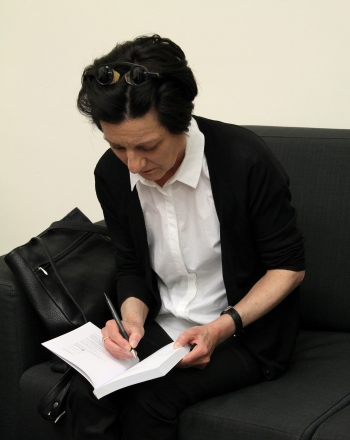Müller was born in Romania in 1953 to an affluent family of Banat Swabians – a German-speaking minority group which had immigrated to southeastern Europe centuries before. Many Swabians in Romania enthusiastically joined the Nazis as they rose to power, later suffering persecution at the hands of Nicolae Ceaușescu's government, which viewed them as dangerous outsiders posing a threat to his regime. Due to her refusal to collaborate with the Communist government, as well as on-going activism in support of free speech, Müller's works were censored, she was persecuted and denied an exit visa until finally being allowed to emigrate to West Germany in 1987. Receiving the Nobel Prize for Literature in 2009, Müller has continued her struggle to emphasize the importance of free speech and the perils of totalitarianism – the focus of many of her works. She often talks about the strained relationship she had with her father after discovering his Nazi past.

Herta Müller recently visited the National Library of Israel with a small group of German academics. The group was shown items from among the Library's diverse holdings related to notable German and Romanian cultural figures, including letters from
Henri Barbusse and
Stefan Zweig to well-known Jewish Romanian writer and philosopher
Eugen D. Relgis. They also viewed a letter from legendary poet
Elsa Lasker-Schüller to educator and philosopher
Ernst Simon, both Jews born in Germany who moved to British Mandate Palestine prior to the Holocaust. Müller's work is often compared to that of Franz Kafka due to their similar literary portrayals of totalitarianism. It seems no wonder, then, that Müller appeared to be most moved by items relating to Kafka, including the personal notebook he used while learning Hebrew. Reflecting on the visit, National Library Academic Director Prof. Haggai Ben-Shammai, who hosted the group, said that as someone who has fought for free speech her entire adult life, "Müller showed a deep appreciation for the National Library's history and purpose, as well as its dedication to disseminating and opening access to knowledge."
